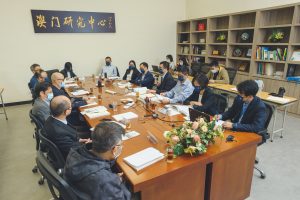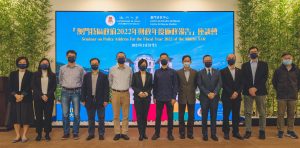The University of Macau (UM) Centre for Macau Studies (CMS) today (17 November) held a seminar titled ‘Policy Address for the Fiscal Year 2022 of Macau SAR’. During the event, experts and scholars discussed the policy address and provided suggestions for the government. Participants agree that the government has a balanced vision during the pandemic. Key issues discussed at the seminar include anti-pandemic measures, the Guangdong-Macao In-Depth Cooperation Zone (Cooperation Zone) in Hengqin, and the development of the gaming industry.
The seminar was chaired by CMS Director Agnes Lam. Edmund Sheng Li, associate dean (academic affairs) of the Faculty of Social Sciences (FSS), comments on the supervision of enterprises funded by public capital. Prof Sheng suggests that the government should improve the applicable laws and regulations and propose a scientific evaluation system within the framework of national laws and management regulations. Prof Ngo Tak-Wing in the same faculty points out that different plans and policies such as the second five-year plan, urban master plan, public gaming consultation, and the master plan for the Cooperation Zone in Hengqin were announced last year. He hopes that the government will introduce supplementary policies that consider the interplay between different plans, so as to prepare a policy blueprint for the future.
Xu Jianhua, head of the Department of Sociology of the FSS, mentions that the decline in crime rates in Macao during the pandemic offers an opportunity to reflect on the size of the current police workforce, the necessity of using new media for policing, and the possibility that the slump in gaming revenues would prompt organised crime groups to find new ways of committing crimes. Julia Lam, deputy service director of Caritas Macau, draws attention to social services and social security during the pandemic, particularly over these issues: 1. caregiver allowance to care for people with severe mental illnesses; 2. barrier-free travel and mobility; 3. training of engineering and technical personnel; 4. targeted employment assistance; 5. mental health policies and measures to prevent suicide; 6. development of the local cultural tourism industry; 7. dental care for people with disabilities; 8. subsidies and incentives for social services on Sundays and holidays; and 9. special tracking studies.
Alfred Wong, associate professor of the Faculty of Science and Technology, comments on the parts about engineering, smart city development, and urban renewal in the policy address. Prof Wong says that since the SAR government plans to spend MOP18.3 billion on infrastructure construction, it should pay more attention to the sustainability and scalability of these projects, which is especially important for underground heating and cooling systems, smart facilities, and power grid construction. Eilo Yu, associate professor of the FSS, suggests that the government should be forward-looking when formulating policies, should assess the necessary facilities for the development of new industries in Macao, and should anticipate changes that may arise in the future and the expected returns on investments in these industries. Prof Yu adds that the government should strengthen public communication regarding civil service accountability, so that the public can better understand the reasons for the implementation of the various policies and measures.
Henry Lei, assistant professor of the Faculty of Business Administration (FBA), thinks that the policy address needs to cooperate with the second five-year plan and the master plan for the Cooperation Zone in Hengqin. Prof Lei believes that there is a need for coordination with the mainland in terms of pandemic prevention and control. He also expresses concern that inflation will affect the economic recovery of Macao since the global supply chains continue to face unprecedented logistical challenges because of the pandemic. Kwan Fung, assistant professor of the FSS, points out that in addition to providing financial assistance, it is also necessary for the government to prepare for economic recovery. Prof Kwan believes that there are still a lot of uncertainties over gaming license renewal in Macao, which will affect investors’ future deployment of investments in Macao.
Ricardo Siu Chi Sen, associate dean (research and development) of the FBA, comments on the review and improvement of the current gaming laws and regulations, especially the gaming credit law, in order to regulate and prevent possible chaos in gaming loans. Chan Kin Sun, assistant professor of the FSS, thinks that the discussion of the Cooperation Zone in Hengqin in the policy address seems to be inadequate, especially the part about the integration of Macao’s infrastructure into the Cooperation Zone and the Guangdong-Hong Kong-Macao Greater Bay Area. He suggests the industries should cooperate with the industrial chains of different provinces and cities in the country. Chan Chi Shing, adjunct lecturer of the CMS, points out that Macao has a serious problem of population aging, and this will lead to a shrinking pool of younger workers in the future, which is not conducive to economic diversification. He stresses that the Cooperation Zone in Hengqin is a major initiative for the economic diversification of Macao, and the SAR government should clearly identify Macao’s role in this project.
| Source: Centre for Macau Studies | |
| Media Contact Information: | |
| Communications Office, University of Macau | |
| Albee Lei | Tel: (853) 8822 8004 |
| Judite Lam | Tel: (853) 8822 8022 |
| Email: | prs.media@um.edu.mo |
| UM 40th | |
| anniversary website: | 40.um.edu.mo |
| UM Website: | www.um.edu.mo |


